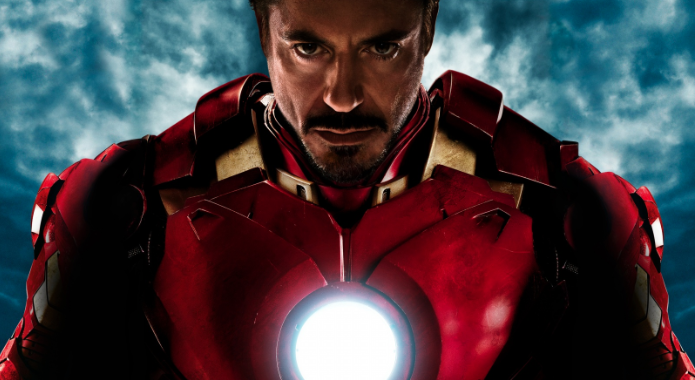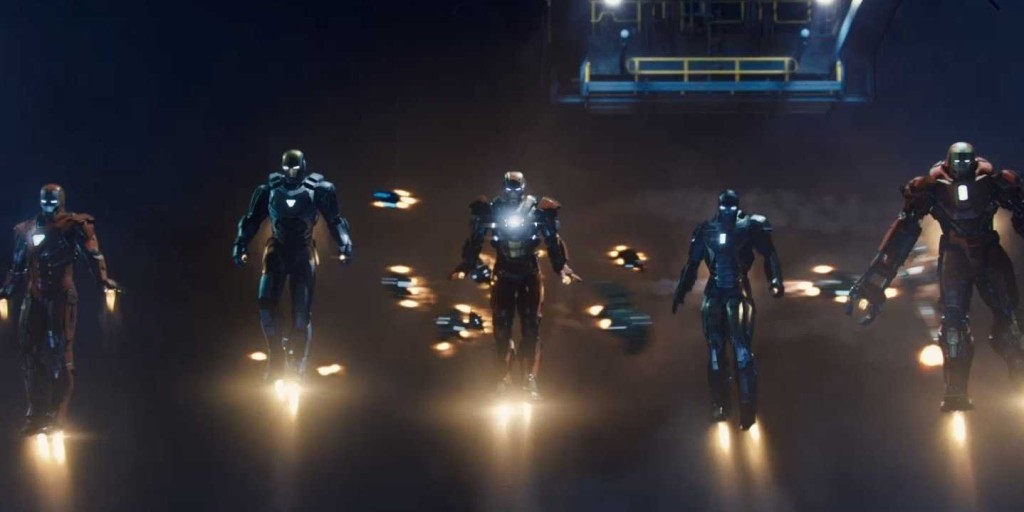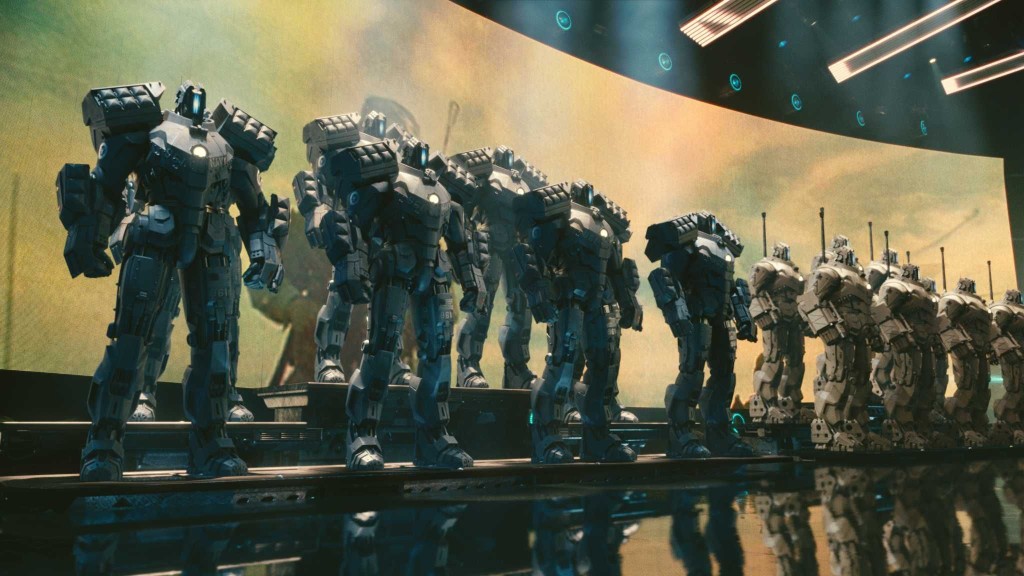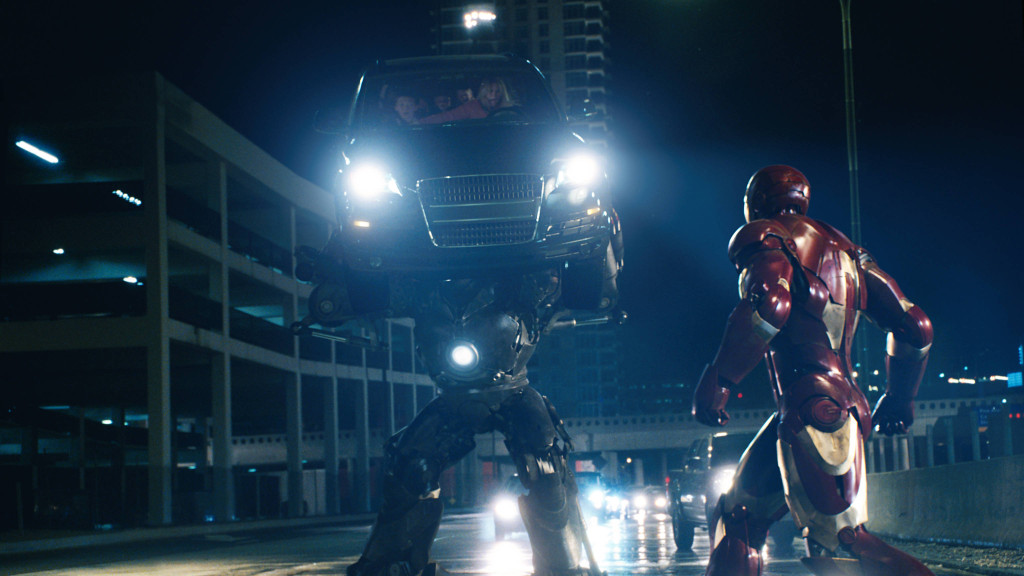It should go without saying that 9/11 didn’t just change the world, it changed the movies. Over the past decade, no other event has seeped into our cinema more thoroughly, from political thrillers that focus directly on the War on Terror to blockbuster escapism inspired by the overseas conflicts that resulted.
Superhero films are no different. Christopher Nolan’s Batman trilogy deals explicitly with themes of fear, trauma and terrorism, and even the Spider-Man films devote scenes to showing New Yorkers coming together to support their hero in times of crisis. In many ways, the superhero genre is perfect for crystallizing and reflecting the post-9/11 zeitgeist, celebrating the triumph of American individualism over mysterious, fantastic and seemingly-unbeatable forces that seek to sow destruction and chaos.
No superhero brand tackles the War on Terror with as much frequency and arguable nuance as the films of Marvel Studios. The heroes in these movies aren’t just extensions of American militarism, beating up bad guys because, well, they’re bad. While they function as a form of fantasy, allowing audiences to delight in comic-book violence, they also capture the national confusion and self-doubt that set in after the United States was crippled by multiple wars, a stagnant economy, and above all, increasing distrust of those in power.
The Marvel movies aren’t just about good guys defeating bad guys, they’re about good guys trying to figure out just what it means to be good, and whether the ends really do justify the means. Captain America has to learn how to fight for American ideals without becoming a piece of militarist propaganda. The Incredible Hulk worries that his response to violence might end up hurting the innocents around him. Thor must repent after wrongfully invading another realm. These aren’t the black-and-white superheroes of the Cold War, they’re the broken and morally murky heroes of an age when it’s not always easy to know if American might equals right.
And at the center of it all, there’s Iron Man. The Iron Man movies don’t just touch on the War on Terror allegorically or symbolically; they take place in the caves of the Middle East and the briefing rooms of Washington D.C., as terrorists try to secure the weapons necessary to attack the U.S. and American politicians look for the best way to fight back. Tony Stark himself was intended by Stan Lee to be the personification of everything people might hate about America—its wealth, its arrogance, its militarism. As a result, while, on the surface, the Iron Man films appear to follow the same “rules” as other action movies, they differ in one very subversive way: most of the time, Tony Stark (and by extension, the United States) is more of a villain than a hero.
Tony Stark Doesn’t Just Kill Bad Guys
The very first scene of Iron Man finds American soldiers being blown up by the very weapons that are supposed to protect them. It’s a theme that will be revisited throughout the series: all advanced weaponry will wind up in the hands of our enemies, and there can be no terrorism without the manufacturers of instruments of terror. The Ten Rings terrorize Afghanistan use weapons from Stark Industries. Ivan Vonka uses Tony’s Arc technology to become Whiplash and later collaborates with weapons designer Justin Hammer, killing innocent people at both the Monaco racetrack and Stark Expo. The Mandarin’s bombings are manufactured by Aldrich Killian and carried out by wounded veterans (whom Tony later kills with an army of unmanned drones).
Tony isn’t always directly responsible for the deaths of these victims of terrorism, but he does contribute to the culture of violence and retaliation that leads to their demise. In Iron Man 2 and Iron Man 3, he grapples with the fact that his family tree is firmly rooted in systemic violence and the Stark name a permanent fixture in war. The attacks by Ivan Vanko are “blowback” from the actions of Tony’s father during the Cold War, Killian’s distorted version of Extremis results partially from Tony’s rejection, and Pepper is nearly killed in an attack by The Mandarin after Tony eggs him on. Intentionally or not, Tony Stark has blood on his hands, even after he decides to become Iron Man
Tony Stark Doesn’t Have the “Right Hands”
One of the main questions raised by the Iron Man films is: Who should control our most powerful weapons? Who can use them responsibly in the War on Terror? The military, Tony, or someone else?
At one point in the original Iron Man, Obadiah Stane says, “These are weapons that will put the balance of power back in our hands, which are the right hands.” He’s referring both to his own individual power and that of the American military, and he’s actually echoing something Tony himself says earlier: “I don’t want this power winding up in the wrong hands. Maybe in mine, it will actually do some good.”
They’re both wrong. The over-arching theme of the Iron Man movies is that there are no “right hands,” and some power is too great to be wielded by anyone, even a superhero. Iron Man ends on a note of hope, that perhaps Tony can overcome his demons enough to use his power responsibly. Iron Man 2 quickly throws that theory out the window.
Many people have claimed that Iron Man 2 is a Republican movie, with some going as far as to say that it was influenced by the philosophy of Atlas Shrugged author Ayn Rand. Specifically, they point to a scene at the beginning of the film in which Tony Stark stands before Congress and argues that he should not be required to give the Iron Man technology to the military. As he puts it, “I’ve successfully privatized world peace.” It’s a moment that’s played for laughs and applause, and it’s easy to see why some might feel Iron Man 2’s central philosophy is one that prioritizes individual achievements and corporate rights over those of the general public. After all, later on in the film, it’s up to Iron Man to stop the drones that were created by Justin Hammer for the military. Tony must have the “right hands,” right?
This reading overlooks one important element: The Tony Stark of Iron Man 2 isn’t a hero, he’s an asshole.
He’s a self-obsessed, egotistical dick, just like he was in the first film, but geared up to 11. Rather than using his identity as Iron Man to focus on helping others, Tony uses it to even further solidify his cult of celebrity. He isn’t a superhero who works silently in the shadows for the public good but a guy who’s in it for the fame and the glory. He places most of the responsibility of protecting the world on his own shoulders, and he’s arrogant enough to think he can do it. But he can’t. It’s only by literally reaching out to Rhodey—the military equivalent of Iron Man he until now had rejected—that he’s able to defeat Vanko.
Iron Man 2 is certainly cynical of the government’s relationship with private weapons contractors, but it suggests a middle ground needs to be found between the power of the corporations and that of the state.
Tony Stark Isn’t Much Different from Those Supervillains
“You start out with something pure, something exciting,” Tony says in Iron Man 3. “Then come the mistakes, the compromises.”
He might as well be talking about himself. From the very beginning, one of the main themes of the Iron Man series is that the War on Terror corrupts everything it touches. Tony Stark is no exception.
The original Iron Man rests on the idea that as technology advances, it will be used to create more and more terrible tools of destruction, even if that isn’t the original intent (a theme later revisited in Iron Man 3). Tony Stark creates a miniature Arc reactor to keep himself alive; this later powers a metal suit that allows him to kill his captors. After returning to the United States, he starts developing the Iron Man suit as a hobby in his garage, initially just as a personal flying machine; it gradually becomes a weapon complete with targeting system and rockets. As Obadiah Stane puts it at the end of the film, “In trying to rid the world of weapons, you gave it its best one!”
Iron Man 3 ties this paradox into an allegory for post-9/11 trauma. It’s a movie about how America, in its misguided quest for meaning after a devastating terrorist attack, turned to war and violence to try and ease the pain. The Tony Stark of Iron Man 3 is so traumatized by “what happened in New York” in The Avengers that he seeks solace in his garage, creating ever more impressive (and, by extension, destructive) Iron Man prototypes. Meanwhile, veterans wounded in the war turn to Aldrich Killian for help, only to become human bombs. The message is clear: The wars waged in response to terrorism lead only to further militarization and trauma, and nobody is helped, only corrupted.
In fact, both sequels to Iron Man find Tony Stark taking on characteristics of the villains from the previous films. In Iron Man 2, he inherits the Messiah complex of Obadiah Stane, convinced that his methods of handling the Iron Man and Arc technologies are the only ones worth considering. The Iron Man suit becomes both a spiritual and physical contaminant—his heart is literally poisoned the more he uses the armor to pursue his own selfish interests. By the time we get to Iron Man 3, he’s created his own version of Whiplash’s unmanned drones, an army of Iron Man prototypes that can act on their own, plus an experimental set of armor that he can control without being inside it. If the second film was a critique of the Obama administration’s reliance on drone strikes, the third film is a strangely uncritical celebration of it, with Tony deftly using his unmanned suits to take out Killian’s henchmen (who, we shouldn’t forget, are actually wounded veterans).
The Iron Man movies are about a lot of things—the cyclical nature of violence, the proper use of power, institutions as inherently corrupt, the manufacturing of fear, and destructive individualism, to name a few—but the main message is one of peace, and how true peace can only be achieved by putting our weapons aside. Each successive film finds Tony becoming more and more like the villains he faces—his ultimate villain is always himself and his own lust to be the guy in control. It’s only at the end of Iron Man 3 that he truly rejects his philosophy of the first film that the best weapon is the one you only have to fire once, destroying all of his Iron Man suits. He can always rebuild them, but the point is that he is not defined by his armor, any more than America has to be defined by its militarism.
Of course, the Iron Man series’ critique of the War on Terror can only go so far. Like most superhero films, they at times perpetuate a fantasy in which the good guys can stop the bad guys without collateral damage. In the first film, Tony Stark takes out a whole group of terrorists without hurting their innocent hostages. In Iron Man 3, his drone strikes are always accurate. Real life proves this often isn’t possible. Even so, the final moments of Iron Man 3 are surprisingly radical, given that most blockbusters argue that our problems can be solved with more weapons and violence, not less. Maybe it’s time we learned a lesson from Tony Stark and realized that there’s more to being a superhero than having the biggest gun.





















22 thoughts on “Tony Stark Is a Villain: How the ‘Iron Man’ Films Subvert Traditional Views of the War on Terror”
When ever I read a piece that starts with “it goes without saying” I stop reading. If it goes without saying, it goes without reading.
While I generally agree with that approach, you may want to actually read this. It’s one of the better pieces we’ve run in a while.
Riiiiight…
Errr… the Obama admin’s drone campaign began only in 2011 and the American public sphere has only began talking about it now. Do you really think a movie released in early 2010 was a critique of it?
You’re correct that it only became a public talking point in recent years. However, the use of drone strikes in places like Pakistan actually began in 2004 under Bush, and the Obama administration dramatically increased the drone campaign as soon as his first term began. I think there’s a good chance Iron Man 2 was meant as a critique, and even if that wasn’t the filmmakers’ intent, that subtext certainly found its way into the film(s).
By that rationale, I find it interesting that Iron Man 2 criticizes drone strikes being a social commentary of the Bush administration; then turns around and praises/justifies drone strikes in Iron Man 3 during the Obama administration. If that is true, these writers should be fired. I go to movies to escape reality and enjoy a show – not to be reminded of what a shitty world we now live in.
Why not both? Enjoy a good moment, but you can still think about the real situation. Enjoying and thinking aren’t opposittes.
Pingback: Weekend Box Office: ‘Star Trek Into Darkness’ Opens With “Just” $84 Million. | Technology
Pingback: Weekend Box Office: ‘Star Trek Into Darkness’ Opens With “Just” $84 Million. | Business
Pingback: Weekend Box Office: ‘Star Trek Into Darkness’ Opens With “Just” $84 Million. | NewsCred Plugin For WPMU
Pingback: Weekend Box Office: ‘Star Trek Into Darkness’ Opens With “Just” $84 Million. | NewsCred Plugin Dev Site
Pingback: Weekend Box Office: ‘Star Trek Into Darkness’ Opens With "Just" $84 Million. | Forbes
Thanks for a spot on, interesting take on IRON MAN. Intentional or not, the movies will be viewed in the future as social commentary.
You said it very well. Actually, in the Avengers, that point was made any number of times by Captain America, but I guess it was easy to overlook amidst all the action. He IS an asshole and what’s more, he is apparently proud of it.
I don’t get the point of this review/essay. It is no ‘startlingly revelation’ that Tony Stark is an egotistical asshole- it is common knowledge. At the heart of the Iron Man comic is the moral dilemma Tony lives with; his history as a weapons manufacturer. To deal with his feelings of guilt, Tony BECAME a weapon. I mean, the essay is thoughtful and well written, but it’s main thesis is old news.
Johnson’s strongest point was identifying the films HUGE flaw; the bad guy-army compromise a bunch of former American soldiers – wounded war vets, to boot. This was a major gaff (kind hard to forgive, really). It reminded me of the even BIGGER gaff from The Matrix; all of those cops and security guards that Neo and friends slaughtered with such brutal style and kung-fu glee? They were all innocent people, ‘trapped’ in the matrix.
I wondered why did extremis make the soliders evil when Pepper had both use of her powers and she was perfectly rational?
Bad writing.
Pingback: The Spring Crop: Year of Bests – 2013 | It Rains... You Get Wet
Tony Stark is, indeed, a villain. The Civil War storyline addresses many of the things you mention in your article.
I disagree. Tony make the same mistakes as the Captain… the greatest of CW is that there no “good” versus “bad”, only people disagreeing and unable to understand the other side.
Very good article, but only one “but”: at the end of Iron Man 3, one of the Tony’s armour attack Pepper, when it ounfuse she with one of the Extremis soldiers. For a second, Tony could kill an innocent (butwe’re talking about a Dinsye movie, so it didn’t happen).
And there still a last final chapter: in Avengers 2, Tony triedto create the perfect system of peace, without the hands of anyone, but then he created Ultron. And moreover, there’s still the incoming Civil War, where Tony will become the face of a Government decided to take charge of every person, every weapon and everyone who would becomea “hero” or a “villain”.
I love your article, but the history isn’t ended, and Tony Stark will become now more than a villain, because the greatest of the Civil War arc is that there’s no heroes, nor villains in the history, and each side have their reasons. It’s the sadestof the lessons.
You can bullshit to yourself as much as you like, but in no way you can turn this propaganda crap into “social commentary” – entire franchise, bar the “Guardians” and to a very small degree “Winter Soldier”, is one big and straightforward recruiting ad !
“From my cold, dead body”
Franchise is a culmination of century of Hollywood’s villiainification of “Other”, close relationship with Pentagon, military-industrial complex and NRA, and unassailable support for Israel.
“War on Terror” is flawed premise since one can not wage war on “Terror”, only Terrorists, and those have a Cause, often just, righteous, logical, and one have to justify killing them and their cause. But “War on Terror” like any war can be adventure and opportunity.
Wars are, also, fought by “big sticks” but won by soldiers – hail Recruits, death to Terror !
“There are people that say progress is dangerous”, but Tony thinks that progress is a most important – yes, franchise adore “progress”, only it doesn’t refer to progress of human state, human reason and conscience, but to human technological endeavour, and that’s actually most important theme underlines entire series – new, better tech equals new, better “bigger stick”.
Coulson nonchalantly threatens to some Russian officers to blow them and entire neighborhood, which is located in Russia, I suspect. if doesn’t let him speak to Shield’s Russian spy-girl.
“Iron Patriot” find himself “liberating” bunch of Muslim women by almost blowing them up first, and sends them off with snoot and “No need to thank me”. They are depicted in such a way Pam Geller, Bill Maher and Sam Harris would be a bit embarrassed.
Although not particularly divers group, the Good Guys of the franchise have few important black characters, even some ethnic Asian is a side-kick of blond Norse demigod, while Russians, Germans and rest of a white characters are divide only by ideology, they are both villains and part of a crew. Only inherently evil are Arabs and/or Muslim – there are no Iranians or Arabs on board !
If you are young white (preferably blond, ok darker is acceptable too as long as casting is good and girl is blond) potentially genius, educating yourself and working for militar can bring you power, money and celebrity status, if you are white and stupid you can serve and experience adventure, if you are black you can serve and become colonel or commander of some kind even. What ever our flaws are or may be we are still above all Other and world is our to control and shape, and if are to do so we need military-industrial complex working in full throttle and without criticism.
Yes, Mandarin reciting few taboos from US history, and few liberals appearing in several sequence belong to (in)famous media Islamophobic clique, with a “clash of civilizations” as their wet dream, with Maher, Joan Rivers, Amanpour – interestingly these ones are mingled with ones from the opposite side of a coin, ones like Bill O’reilly.
Only journalist dared to ask right questions we see immediately giving up and exchanging her truly liberal-progressive ideals for Tony Stark’s cock and getting thrown out in the morning as “trash” by PP.
Who can argue with that – only women that we see are worth something more then being objects are patriotic, serving their homeland. All others are “party girls” free to walk around and enjoy equality as sexy background, Hollywood ideal woman, or being walking Arab and/or Muslim stereotypes, unwittingly liberated from their lives – fathers, brothers, husbands and sons – by US Patriot(s).
Yes, Iron Man – and for that matter every other “Good Guy” character – is a villain, but not by design, it’s not what film producers wanted. He is a villain only to those who see franchise as a villainous militaristic propaganda.
Thor, Odin, and entire Asgard, are morbid fascists, but that was not film’s theme and intended massage – Odin “ushers” 1000 years of peace by exterminating many strange looking species of color, i.e. Frost Giants, Dark Elves, and who knows who else – Hitler and Nazis too wanted to usher 1000 years peace, while feeding their fantasies with Norse mythology.
Thor explains to Coulson how Asgardians “imagine” they are more advanced people then humans, and then venture to wage war on Earth, like horned animal from some planet, he explains, stomping on anything and anyone who is in its track – almost as if writers and producers were thinking of American “projection of power” around our real world and trying to criticize its behavior, only all the horrific consequences of this misanthropic “meddling” are confined to New York, US, so ironically we see US as an innocent and completely undeserving victim of that “what happened in New York”.
When Loki offers “Peace” to Fury and the world of humanity, that’s absolutely unacceptable to one-eyed, but his own “peace” through Shield and its “bigger stick” is the “Promise” to World, …. and worlds.
Essay is mind-bogglingly absurd and contradictory: here’s one example, how on earth is franchise “critique of the War on Terror” in any shape or form if they “at times” – it’s more all the time ! – “perpetuate a fantasy in which the good guys can stop the bad guys without collateral damage” ?
People can bullshit to yourself as much and as long as they like, but in no way one can turn this racially charged propaganda crap into subversive social commentary – entire franchise, bar the “Guardians”, which are just plain racist, and to a very small degree “Winter Soldier”, is one big and straightforward recruiting ad for the perpetuated “Clash of Civilisations” !
As an essay it’s a well written, but author fell for it’s deception – ultra-conservative (nationalistic-racist-militaristic) propaganda from a failing empire, wrapped into deceptive colorful liberal packaging !
Maybe Kevin Feige and rest of the gang